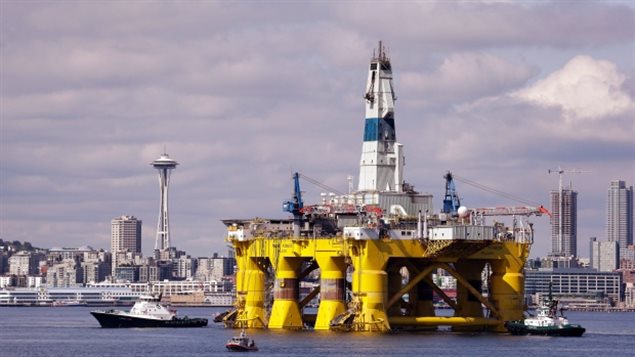Royal Dutch Shell is calling it quits in the Arctic, for now. In a press release today from the The Hague, Netherlands, the company said it made the decision following disappointing results from an exploratory well it just completed.
Shell discovered indications of oil and gas in the well in the Chukchi Sea about 120 kilometres off Alaska’s northwest coast,but the petroleum was not in quantities sufficient to warrant additional exploration in that portion of the basin.
“Shell continues to see important exploration potential in the basin, and the area is likely to ultimately be of strategic importance to Alaska and the U.S.,” said Marvin Odum, president of Shell USA, in the announcement. “However, this is a clearly disappointing exploration outcome for this part of the basin.”
“In the future it is going to be harder and harder for companies to access resources in fragile environments”
Shell is halting exploration off Alaska “for the foreseeable future,” the company said. It has spent more than $7 billion US on Arctic offshore development in the Chukchi and Beaufort seas.
Environmental groups have actively protested the Arctic offshore drilling as they say industrial activity and more greenhouse gases will harm polar bears, walrus and ice seals.
Bird breeding habitat is the major concern for the Audobon Society, and representatives were thrilled with the announcement.
“Some ideas are just non-starters, like drilling for oil in the Arctic Ocean,” said Audubon CEO David Yarnold in an email statement.
“The Arctic Ocean is crucial for marine birds and mammals, holding globally significant feeding and resting areas for dozens of species. Spills under ice sheets can’t be controlled, and America doesn’t need the oil in order to maintain its energy independence.”
Warren Mabee, director of the Queen’s Institute for Energy and Environmental policy, said low oil prices and the high cost of operating in the Arctic will have played a role in Shell’s decision. But public awareness of the threat to the Arctic may also have been an important factor.
“I suspect the social pressure against drilling in the Arctic and maybe some recognition of the challenges of operating up there would have contributed to this decision,” Mabee told CBC News.
“In the future it is going to be harder and harder for companies to access resources in fragile environments and this may be a sign that companies are beginning to be aware of that,” he added.







For reasons beyond our control, and for an undetermined period of time, our comment section is now closed. However, our social networks remain open to your contributions.